Shopify vs Square Online: Final verdict
Shopify and Square Online both offer robust platforms for building and managing online stores, but they cater to different business needs and scales.
Shopify (Overall Grade: 8.1/10)
is a comprehensive ecommerce solution ideal for businesses looking to scale. It excels in providing advanced ecommerce features, extensive integrations, and superior customer support. When comparing Shopify vs Square Online, Shopify stands out for its sophisticated design templates, powerful marketing tools, and robust security measures, making it the preferred choice for serious online retailers.
Square Online (Overall Grade: 7.2/10)
is tailored for small to medium-sized businesses, particularly those transitioning from brick-and-mortar to online sales. It offers an intuitive, user-friendly interface and seamless integration with Square’s payment processing and business management tools. Considering Shopify vs Square Online, Square Online is a great option for businesses seeking an easy-to-use platform with strong POS capabilities and essential ecommerce features.

|

|
|
|---|---|---|
Design functionalities & templates |
8.2 |
7.4 |
Ease of use |
7.5 |
8.4 |
Ecommerce |
9.2 |
7.3 |
Website Editors |
7.9 |
6.6 |
Product testing options |
8.1 |
7.8 |
Price |
8.2 |
7.5 |
Hosting quality |
9.0 |
7.8 |
Website speed optimization |
7.8 |
6.2 |
Plugins and integrations |
8.7 |
7.6 |
Marketing features |
8.8 |
7.4 |
Customer support |
8.6 |
6.7 |
Security |
9.0 |
8.5 |
AI capabilities |
7.9 |
7.4 |
User Management |
6.5 |
5.2 |
Which one is the best for ecommerce: Shopify or Square Online?
 9.2
9.2
 7.3
7.3
Verdict
: Shopify is the superior choice for comprehensive ecommerce needs, while Square Online is ideal for businesses seeking seamless integration with POS systems.
Shopify
: With a score of 9.2, Shopify excels in providing a wide range of tools for creating and managing online stores. It offers advanced inventory management, multi-channel selling, and detailed analytics, making it perfect for businesses aiming to scale. When comparing Shopify vs Square Online, Shopify stands out for its extensive ecommerce features and flexibility.
Square Online
: Scoring 7.3, Square Online is tailored for retailers, restaurants, and service businesses. It integrates seamlessly with Square’s payment and POS systems, offering a unified management solution for both online and in-person sales. However, it lacks the depth and scalability of Shopify’s ecommerce capabilities.
Which one is the best for informational and business websites?
 6.8
6.8
 7.4
7.4
Verdict
: When it comes to creating informational and business websites, Square Online has a slight edge over Shopify. Square Online’s user-friendly interface and comprehensive integration with business management tools make it a more suitable choice for businesses looking to establish an online presence without the primary focus on ecommerce.
Shopify
: Shopify, scoring 6.8, is primarily designed for ecommerce, offering a range of tools for product listing, payments, and order fulfillment. While it can be used for informational websites, its features are more tailored towards online stores, which might make it feel overly complex for simple informational needs. Shopify’s templates are sleek and professional, but the platform’s strength lies in its ecommerce capabilities.
Square Online
: Square Online, with a score of 7.4, is a comprehensive website builder that caters to retailers, restaurants, and service businesses. It offers customizable templates and easy drag-and-drop tools, making it accessible for users without coding skills. The platform’s integration with Square’s suite of payment processing and business management tools provides a seamless experience for businesses transitioning from brick-and-mortar to online operations. This makes Square Online a more suitable option for informational and business websites compared to Shopify.
Shopify vs Square Online: Detailed comparison
Design functionalities & templates
Design FunctionalitiesRepresents how well each platform allows for creative design and customization of websites.Score Components:
- Template Variety (30%): Range and quality of design templates.
- Customization (30%): Flexibility and options for design alterations.
- User Interface (20%): Ease and intuitiveness of the design process.
- Responsiveness (10%): Adaptability to different devices and screen sizes.
- Innovation (10%): Unique design features and tools.
 8.2
8.2
 7.4
7.4
🏆
Winner: Shopify.
If you’re looking for a platform that offers more professional and sophisticated design ideal for ecommerce sites, Shopify is the preferred choice.
Shopify’s templates are sleek and professional, ideal for ecommerce sites. They offer a sophisticated look with a focus on online stores. While the free template selection is not large, Shopify’s premium theme store provides a variety of industry-specific options, offering advanced features for a strong brand presence.
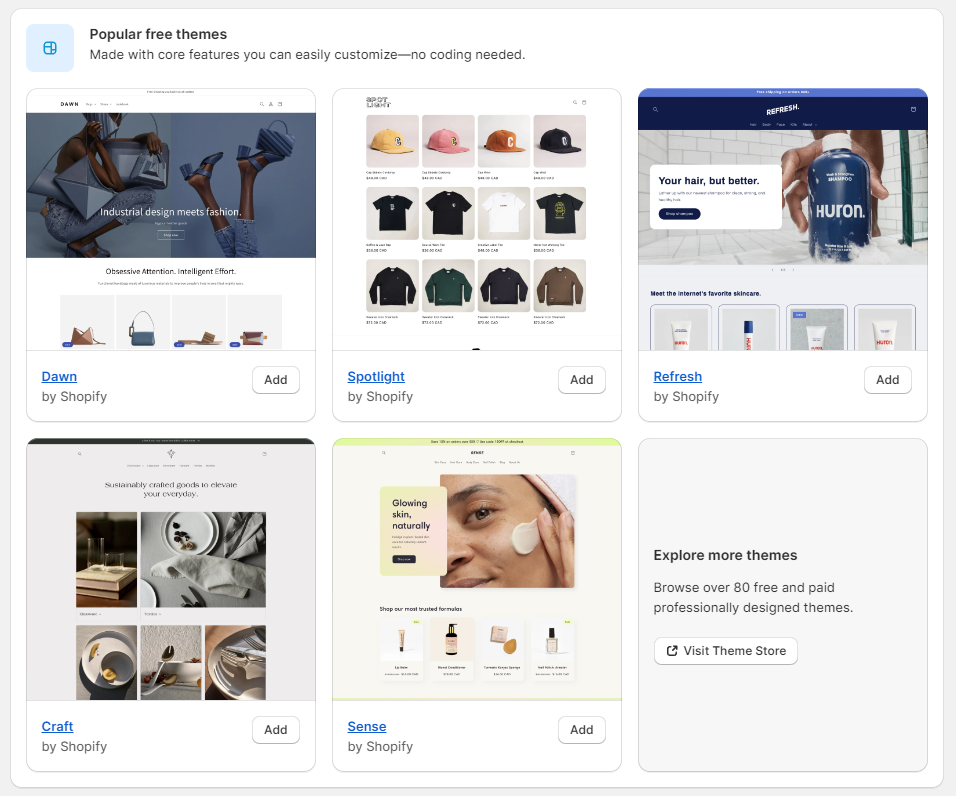
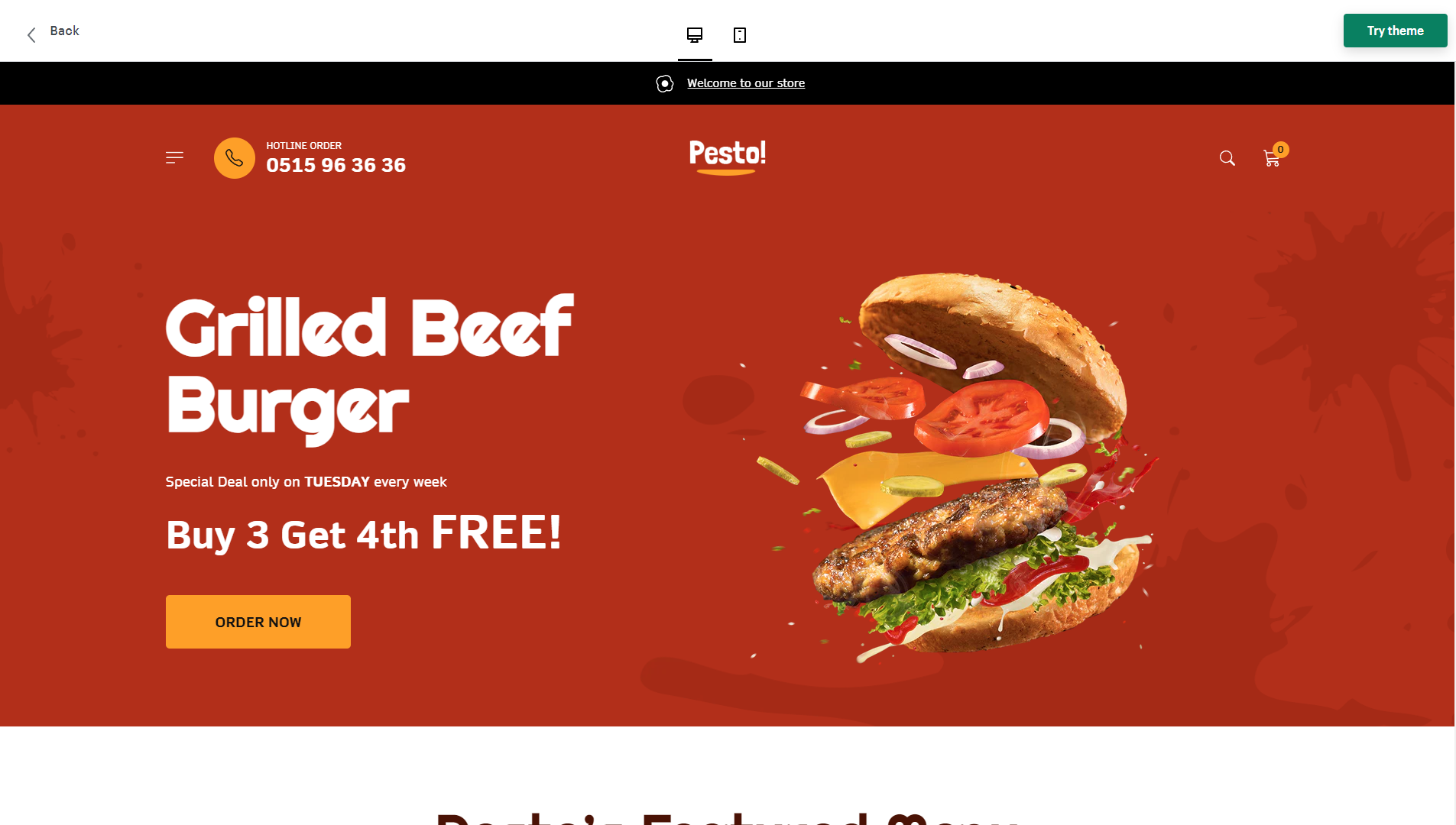
Compared to Shopify, Square Online offers a flexible website builder with a focus on e-commerce, providing a variety of design options through integration with platforms like Weebly. Users can customize their sites extensively, choosing from themes and preset styles to best represent their brand. While the exact number of templates available directly from Square is not specified, the integration with Weebly provides about a hundred themes, including 15 for online stores, emphasizing professional design and mobile responsiveness.
Get a head start on website creation with AI
Create a custom website tailored to your business needs 10X faster with 10Web AI Website Builder!
Ease of use
Ease of useReflects the platform’s overall user-friendliness.Score
Components:
- Learning curve (40%): Quickness and ease of getting started.
- Interface design (30%): Simplicity and intuitiveness of layout.
- User guidance (20%): Quality of tutorials and support.
- Flexibility (10%): Adaptability to various user skills.
 7.5
7.5
 8.4
8.4
🏆 Winner: Square Online
. With a score of 8.4, Square Online offers an intuitive and user-friendly website building experience, making it accessible for users without coding skills. Shopify, scoring 7.5, provides a robust platform but with a steeper learning curve, especially for those new to ecommerce. If ease of use is a priority, Square Online is the clear winner in this category.
Learning Resources
🏆 Winner: Shopify
. While both platforms offer solid learning resources, Shopify goes a step further with its wide array of detailed tutorials and active community forums, making it easier for users to learn and adapt.
For ecommerce
EcommerceMeasures the platform’s effectiveness in supporting online business activities.Score Components:
- Ecommerce themes and templates (20%): Variety and design of templates.
- Product management (25%): Ease of managing and organizing products.
- Payment options (25%): Variety and convenience of payment methods.
- Ecommerce features (20%): Features for managing an ecommerce store.
- Integration (10%): Compatibility with external e-commerce tools and services.
 9.2
9.2
 7.3
7.3
Shopify and Square Online are both robust platforms for ecommerce, but they cater to different needs. Shopify, with a score of 9.2, is a comprehensive ecommerce platform that provides a wide range of tools for creating and customizing online stores, managing products, processing payments, and handling order fulfillment. On the other hand, Square Online, scoring 7.3, is designed to help businesses create professional, fully integrated online stores and websites, particularly tailored for retailers, restaurants, and service businesses.
 |
 |
|
|---|---|---|
Ecommerce themes and templates |
8.2 |
6.8 |
Product page customization |
8.5 |
7.6 |
Payment processing and commissions |
8.8 |
7.9 |
POS capabilities |
8.1 |
9.0 |
Payment gateways |
9.5 |
7.5 |
Product numbers |
9.0 |
7.0 |
Additional ecommerce features |
9.1 |
7.2 |
Shopify ecommerce features:
- Comprehensive store builder
- Shopify Payments and other gateways
- Advanced inventory management
- Multi-channel selling
- Abandoned cart recovery
- Detailed analytics and reporting
Square Online ecommerce features:
- Product Listing and Inventory management
- Payment Processing and POS features
- Shipping and Fulfillment
- Marketing features
Ecommerce themes & templates
Shopify offers about 150 modern responsive themes for creating a virtual storefront, ensuring a good look on both desktop and mobile devices. While some themes are free, others cost between $170 to $380. In contrast, Square Online offers a range of eCommerce templates designed to meet various business needs, enabling users to customize their sites to match their brand identity. It includes dynamic styling tools, personalized user experiences, and integrated payment solutions, including Square’s own payment gateway.
Product page customization
Shopify allows for three options per product, totaling 100 unique variations. For products with numerous options, creating separate listings on Shopify can be a more manageable approach. While Shopify offers titles, descriptions, and image galleries with zoom effects, customization options like adding ribbons, size charts, and wishlists are not as straightforward. However, Shopify distinguishes itself with additional features through its extensive library of extra apps, offering functionalities like reviews, Facebook stores, eBay item importers, and a unique Augmented Reality feature for an enhanced customer experience.
On the other hand, Square Online allows for up to 250 variations per item, like different sizes or versions, through “Selectable Options” in the item details section of your online store. Additionally, “Item Modifiers” allow for further customization by letting customers choose options or input custom text, such as engraving names on jewelry, without affecting inventory levels.
Payment processing
Shopify offers payments with typical charges of
2.9% + 30¢
per online transaction on basic plans, and lower fees for higher-tier plans. However, it adds extra fees for using other payment gateways. Shopify Payments is Shopify’s own payment processing gateway. It allows merchants to accept credit card payments directly on their store without having to integrate third-party payment providers. This simplifies the payment process, reduces transaction fees, and streamlines the handling of finances.
Square Online supports a variety of payment options including Square Pay, Apple Pay, Cash App Pay, Google Pay, and Afterpay, catering to diverse customer payment preferences. The platform charges a transaction fee of
2.9% + 30¢
per online transaction for its free plan, with a discounted fee available on the Premium plan. Additionally, Square offers comprehensive POS capabilities, with a range of hardware solutions that seamlessly integrate with its online store and point of sale systems, ensuring a unified management system for both online and in-person sales.
Website Editors
Website EditorsEvaluates the platforms’ website building and editing capabilities.Score Components:
- Customization tools (40%): Range and power of editing features.
- Editor usability (30%): User experience within the editor.
- Design flexibility (20%): Freedom in layout and design changes.
- Update and maintenance ease (10%): Simplicity of updating and maintaining the site.
 7.9
7.9
 6.6
6.6
🏆
Winner: Shopify
. Shopify’s editor, with a score of 7.9, excels in providing a streamlined, ecommerce-focused editing experience. It’s particularly beneficial for users who prioritize efficient management of online stores. The editor is straightforward, making it easy to add products, manage inventory, and set up payment methods. Shopify’s editor is optimized for sales and business growth, with built-in tools specifically designed for ecommerce businesses.
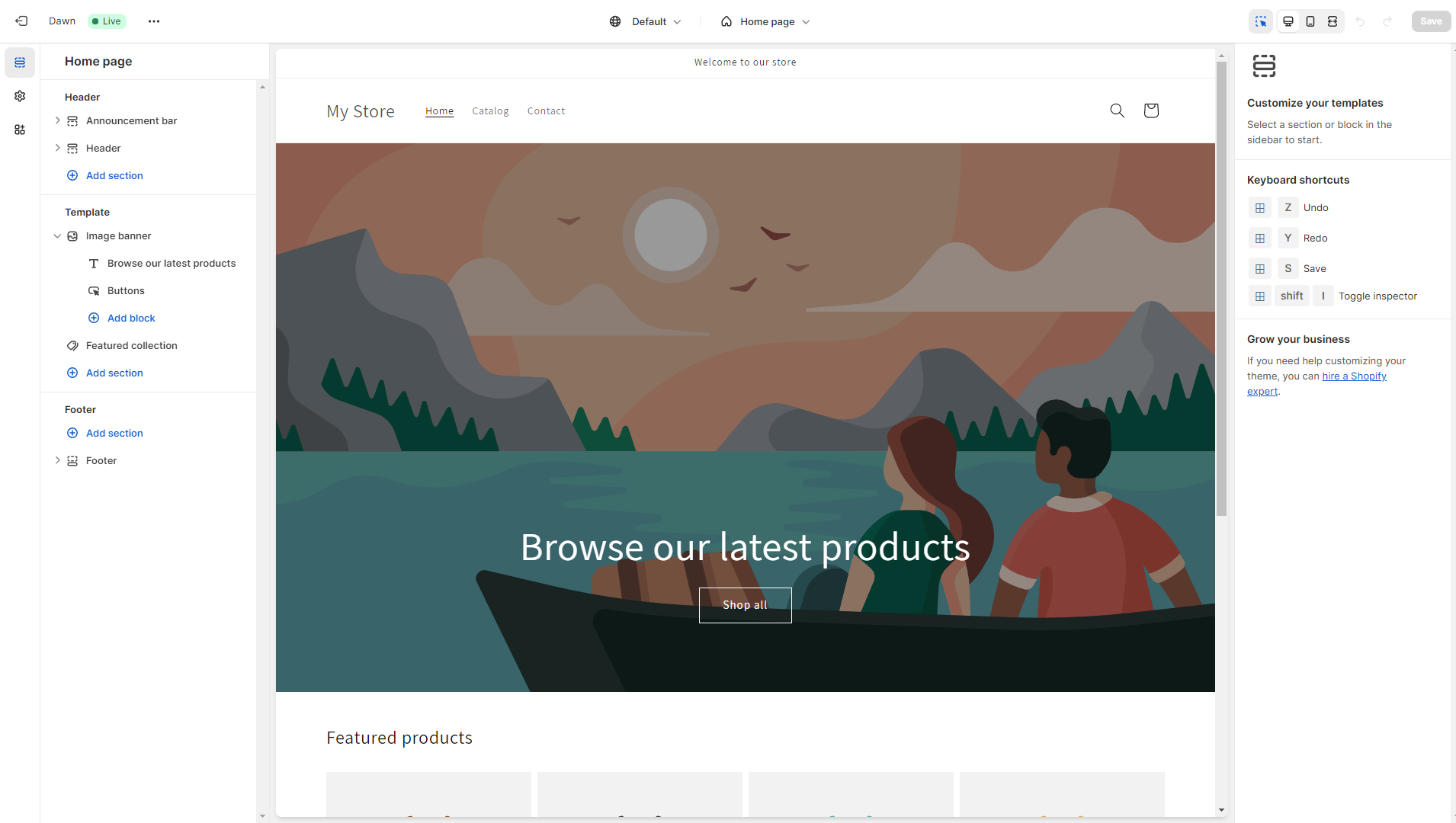
Square Online’s website builder, scoring 6.6, is designed for businesses looking to establish an online presence with ease, focusing on e-commerce functionality. It offers limited customization options, aiming to simplify the design process, yet includes essential e-commerce and marketing tools suitable for a variety of business needs. While Square Online is user-friendly and efficient for quickly setting up a website, it may not cater to those seeking extensive design flexibility or advanced e-commerce features.
Mobile editor/app
 8.0
8.0
 5.5
5.5
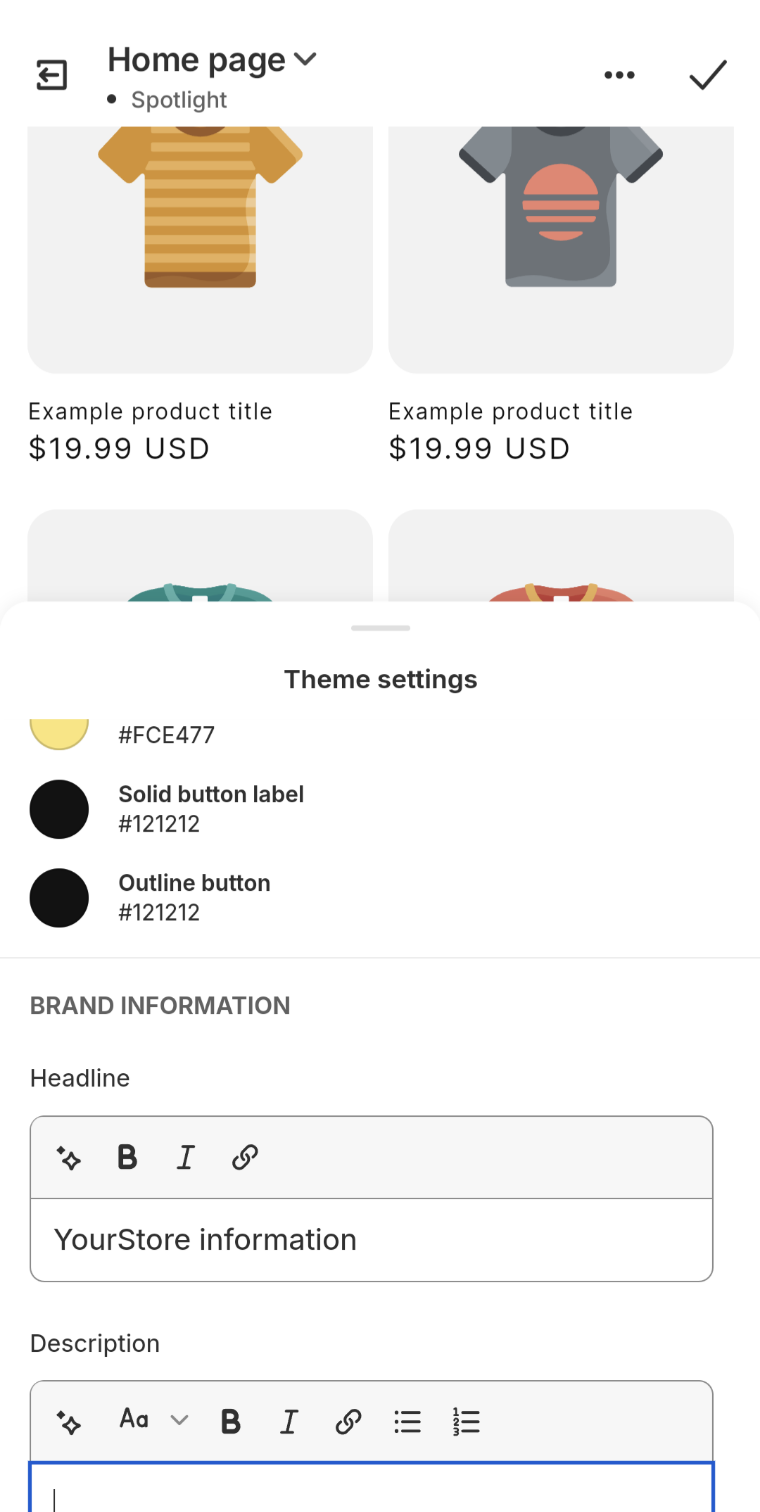
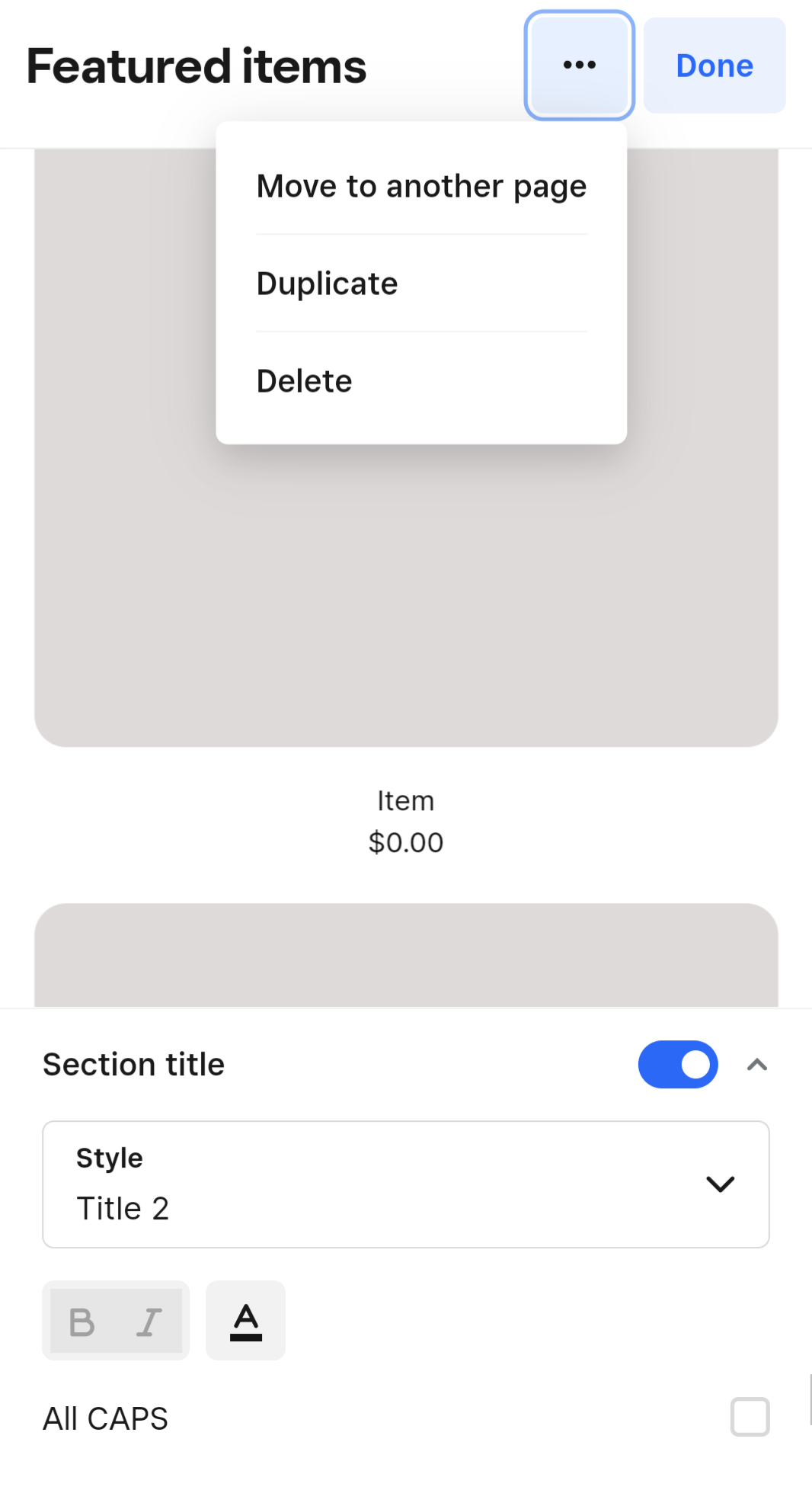
🏆
Winner: Shopify
. Shopify and Square Online both offer mobile solutions for managing your website, but they cater to different needs and skill levels. Shopify’s mobile app includes a user-friendly mobile theme editor that allows users to customize their online store website directly from their mobile device. This feature enables the addition, removal, editing, and rearrangement of content on the store’s website, offering convenient on-the-go adjustments to the store’s appearance and layout.
On the other hand, Square Online does not have a dedicated mobile editor app. Users can manage and edit a website built with Square Online using the mobile browser version, however, it comes with certain limitations. Therefore, Shopify is the clear winner in this category due to its dedicated mobile app and superior mobile editing capabilities.
Product testing options
Product Testing OptionsAssesses the options for trying out platform features before commitment.Score Components:
- Trial quality (40%): Extent and usefulness of the trial or free version.
- Feature accessibility (30%): How many features are available to test.
- Trial duration (20%): Length of the trial period.
- Ease of transition (10%): Smoothness of moving from trial to paid plans.
 8.1
8.1
 7.8
7.8
Overall Result
:
Shopify wins
. Shopify scores 8.1, while Square Online scores 7.8 in product testing options. Shopify offers a 14-day free trial with access to all features, while Square Online offers a 30-day free trial with the possibility to test premium features, but requires billing information. Shopify does not have a traditional money-back guarantee, but the account automatically closes after the trial if not continued. Square Online does not offer a money-back guarantee.
 |
 |
|
|---|---|---|
Free Plan |
No (14-day free trial) | Yes (30-day free trial) |
Trial Duration |
14 days | 30 days |
Testing Premium Features |
All features during free trial |
Yes, but requires billing information |
Money Back Guarantee |
No | No |
Price
PriceLooks at the cost-effectiveness and value for money of each platform.Score Components:
- Plan value (40%): What each pricing tier offers.
- Transparency and clarity (30%): Clearness of pricing structures.
- Flexibility of plans (20%): Range of options to suit different budgets.
- Hidden costs (10%): Additional expenses not included in the plan.
 8.2
8.2
 7.5
7.5
Shopify offers better value for the price compared to Square Online, with a higher price score and a discount for annual subscriptions. However, Square Online offers a free plan for businesses just starting out.

|

|
|
|---|---|---|
Free |
No offering at this amount. |
Free ($0/month): For businesses who want to start selling online fast. Online payments with 2.9% + 30¢, basic-site layouts and design controls, tax calculation, unlimited items, SEO tools, blog feature, Facebook ads. |
$20-$30 |
Shopify Basic ($29/month): Unlimited products, 2.9% + 30¢ card fee with Shopify payments, Extra 2% gateway fee without Shopify Payments, Abandoned cart recovery, Automated sales tax, Digital products, POS Integration, 2 staff accounts. Value for price: 8.0 |
Plus ($29/month): For businesses looking to drive online growth and streamline operations. Includes all the features of the free plan, plus, free custom domain for a year, professional branding, custom embed code, manage multiple sites, pre-orders, abandoned cart recovery, free shipping and delivery progress bar, product reviews, discounts, website statistics. Value for price: 7.5 |
$70-$80 |
Shopify Standard ($79/month): Lower card fees (2.6% + 30¢), Gift cards, Professional reports, 5 staff accounts. Value for price: 8.5 |
No offering at this amount. |
$200+ |
Advanced Shopify ($299/month): Lowest card fees (2.49% + 30¢), Advanced report builder, Real-time carrier shipping, Up to 15 staff accounts Value for price: 8.8 |
No offering at this amount. |
location. As a result in rare cases the prices displayed here can differ from the ones you see on their
websites.
Hosting quality
Hosting
qualityExamines the reliability and performance of the hosting solutions.Score Components:
- Uptime (40%): Consistency and reliability of website availability.
- Speed (30%): Loading times and performance.
- Bandwidth and storage (20%): Sufficiency of resources provided.
- Data centers (10%): Quality and distribution of hosting infrastructure.
 9.0
9.0
 7.8
7.8
Winner: Shopify
Shopify’s proprietary cloud-based hosting, 99.99% uptime guarantee, and five global data centers make it a superior choice for hosting. Square Online also offers hosting with unlimited bandwidth, but it does not specify the type of hosting it provides or the locations of its data centers. It also has a slightly lower uptime of 99.96% and does not offer an uptime guarantee.
 |
 |
|
|---|---|---|
Do they offer hosting? |
Yes, included in all paid plans |
Yes, with unlimited bandwidth |
Data Centers: |
5 globally: USA (Ashburn, Virginia; Santa Clara, California), Canada (Toronto, Ontario), Ireland (Dublin), and Singapore |
Square Online does not disclose the locations of its data centers |
Type of hosting: |
Proprietary cloud-based hosting |
The platform does not specify the type of hosting it provides |
Uptime: |
99.99% |
99.96% |
Uptime Guarantee: |
Yes, 99.99% |
No |
Website Speed Optimization
Website Speed OptimizationEvaluates optimization of website loading timesScore Components:
- PageSpeed Score (30%): Google’s score indicating performance optimization.
- Loading Time (30%): The average time until a website is fully interactive.
- Mobile Optimization (15%): Optimization effectiveness for mobile devices.
- Resource Optimization (15%): Optimizing images, scripts, and other heavy resources.
- CDN Usage (10%): Use of CDN to enhance speed across geolocations.
 7.8
7.8
 6.2
6.2
🏆 Winner: Shopify
Both Shopify and Square Online prioritize website performance and page speed, but Shopify’s focus on app efficiency and theme optimization gives it an edge over Square Online.
 |
 |
|
|---|---|---|
Focus |
App optimization, Google AMP |
Lazy Loading, Code Minification, Caching, Image optimization |
Performance Tools |
Google Lighthouse, PageSpeed Insights |
Not specified |
Key Strategies |
App efficiency, Theme optimization |
Lazy Loading, Code Minification, Caching, Image optimization |
Load Times |
Varies widely, dependent on optimization |
Varies depending on optimization and website complexity |
Page Speed Scores Range |
Scores vary; influenced by apps, images |
Varies depending on optimization and website complexity |
Core Web Vitals Improvement |
Emphasis on LCP, FID, CLS improvements |
No information provided |
Shopify places a strong emphasis on website performance and page speed. Its approach to enhancing site speed includes app optimization by removing unneeded app code, conditionally loading apps, avoiding immediate pop-up displays, and incorporating app functionality directly into themes. This approach leverages Shopify’s fast servers and CDN network to boost load speed. Shopify also suggests utilizing Google AMP for faster mobile page loads, although with some design compromises. Analysis of Shopify sites showed a range of Shopify speed scores, with Google PSI scores and load times varying widely, influenced by apps and images. Shopify also emphasizes improvements in Core Web Vitals, specifically LCP, FID, and CLS.
On the other hand, Square Online’s strategies for speed optimization include Lazy Loading, Code Minification, Caching, and Image optimization. However, Square Online does not provide any specific information on their Core Web Vitals improvements. The load times and PageSpeed scores for Square Online vary depending on optimization and website complexity.
Get a head start on website creation with AI
Create a custom website tailored to your business needs 10X faster with 10Web AI Website Builder!
Plugins and integrations
Plugins and integrationsMeasures the range and effectiveness of additional plugins and integrations.Score Components:
- Variety of options (40%): Range of available add-ons.
- Integration smoothness (30%): Ease of integrating plugins into the site.
- Quality of plugins (20%): Functionality and reliability of the options.
- Custom integration capabilities (10%): Support for custom or third-party integrations.
 8.7
8.7
 7.6
7.6
🏆 Winner: Shopify.
With a score of 8.7, Shopify outperforms Square Online, which scores 7.6. Shopify offers over 8,000 apps in its App Store, covering a wide range of functionalities. These apps come with various pricing options, including free, paid, freemium, and one-time payment models. Key Shopify integrations feature Oberlo for dropshipping, Klaviyo for email marketing, Yotpo for reviews, Printful for print-on-demand, Shopify POS for sales, Google Analytics for insights, Facebook Channel for social selling, ShipStation for shipping, QuickBooks for accounting, Privy for conversions, Smile.io for loyalty, SEO Manager, AfterShip for tracking, Spocket for products, and Gorgias for customer service, enhancing various ecommerce aspects.
On the other hand, Square Online supports a wide array of app integrations to facilitate various aspects of business operations, including eCommerce, accounting, marketing, and employee management. These integrations span from free options to premium services, with pricing varying widely depending on the app’s features and capabilities. Square Online’s app integrations significantly enhance the platform’s capabilities, allowing for a broad range of advanced functionalities. These include seamless eCommerce operations through integrations with platforms like WooCommerce and BigCommerce, streamlined accounting processes with software such as Xero and QuickBooks, effective marketing campaigns via Mailchimp, and specialized operational tools for various industries, including restaurant management with apps like BentoBox and Deputy.
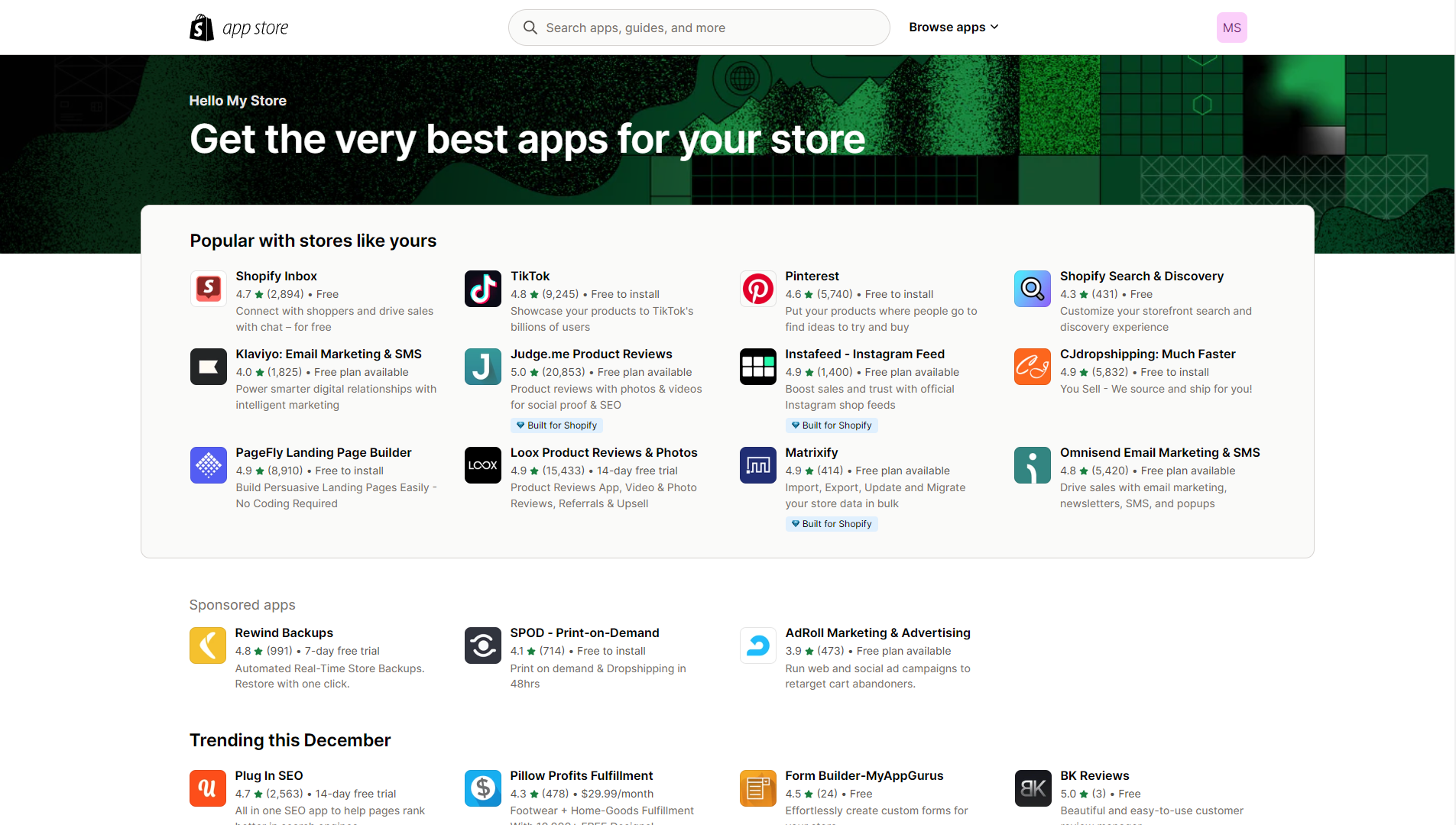
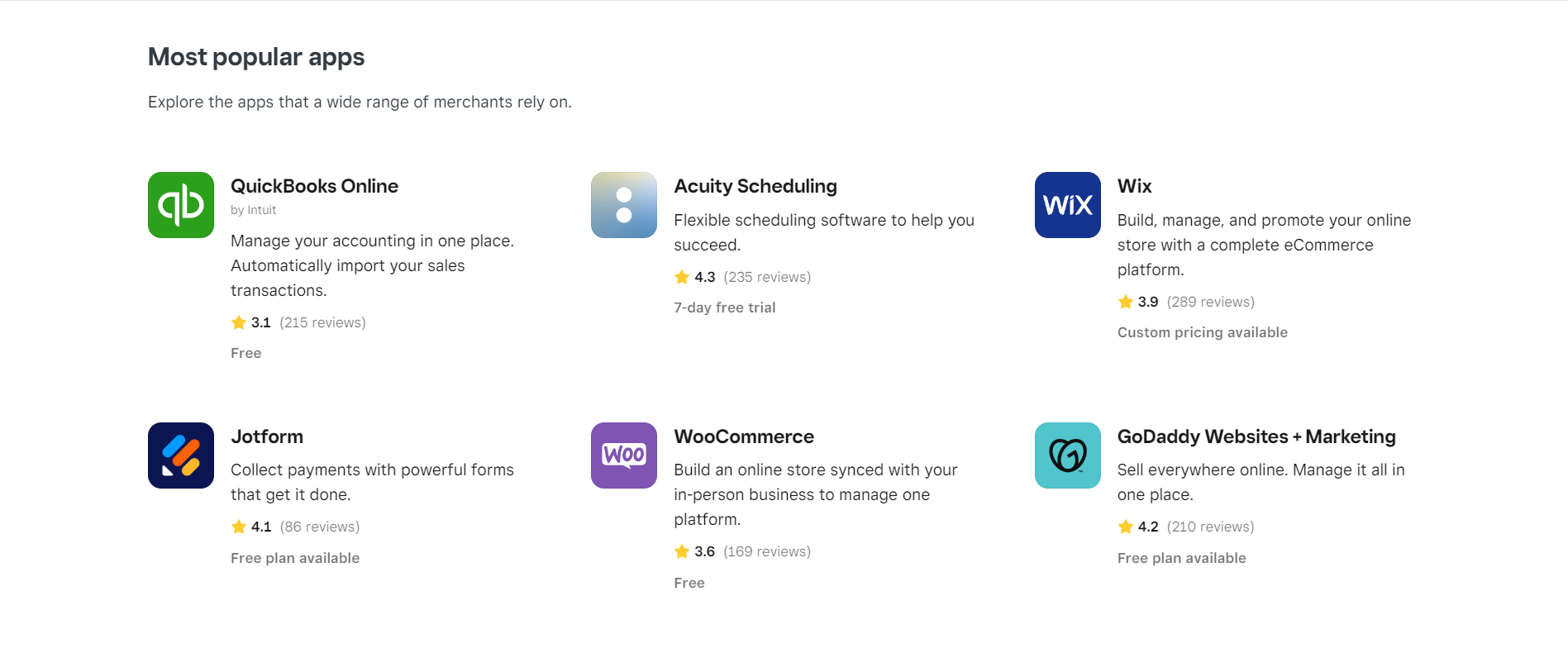
Marketing Features
Design FunctionalitiesRepresents how well each platform allows for creative design and customization of websites.Score Components:
- Template Variety (30%): Range and quality of design templates.
- Customization (30%): Flexibility and options for design alterations.
- User Interface (20%): Ease and intuitiveness of the design process.
- Responsiveness (10%): Adaptability to different devices and screen sizes.
- Innovation (10%): Unique design features and tools.
 8.8
8.8
 7.4
7.4
🏆
Overall Winner: Shopify
. Shopify stands out for its more advanced ecommerce-focused marketing tools, especially in analytics and ad campaign management. Square Online offers a more basic set of marketing tools, which are straightforward and easy to use.
 |
 |
|
|---|---|---|
SEO Tools |
||
Email Marketing |
||
Blogging |
||
Social Media Integration |
Advanced integration for selling directly on social platforms |
Basic integration for selling directly on social platforms |
Analytics and Reporting |
Detailed analytics for in-depth insights |
Basic analytics for website traffic and engagement |
Ads and Promotions |
Google Ads integration; sophisticated ad campaign management |
Basic ad campaign management and promotions |
Customer Support
Customer supportEvaluates the quality and availability of support options.Score Components:
- Response time (40%): Speed of support responses.
- Support quality (30%): Effectiveness and helpfulness of the support.
- Availability (20%): Range of support channels (phone, chat, email).
- Resource richness (10%): Quality of self-help and educational materials.
 8.6
8.6
 6.7
6.7
🏆 Winner: Shopify
. In the Shopify vs Square Online comparison, Shopify takes the lead with a customer support score of 8.6. Shopify offers 24/7 support through chat, email, and phone, ensuring that users can get help whenever they need it. The platform also provides clear tutorials, an extensive community forum, and a valuable marketing blog, making it easier for users to find solutions and grow their businesses.
Square Online, with a customer support score of 6.7, offers support through phone, live chat, and email, but with more limited hours. General inquiries are handled from 6 AM to 6 PM Pacific Time on weekdays, and account issues are addressed Monday to Friday, 9 AM to 9 PM EST. While Square Online does provide 24/7 phone support for premium plan users, its overall support availability is not as comprehensive as Shopify’s. However, Square Online’s support team is praised for being helpful and responsive within the available hours.
Security
SecurityLooks at the platforms’ security measures and data protection.Score Components:
- Data protection (40%): Safeguards for user and customer data.
- SSL and encryption (30%): Implementation of secure connections.
- Compliance (20%): Adherence to industry security standards.
- Regular updates (10%): Frequency of security updates and patches.
 9.0
9.0
 8.5
8.5
🏆
Winner: Shopify
. Shopify’s security measures are slightly more comprehensive than those of Square Online, earning it a higher security score. Shopify’s security features include secure infrastructure, encryption, limited access, compliance with data privacy regulations, data minimization, user control and transparency, two-factor authentication, regular audits, and a dedicated incident response team.
Square Online also prioritizes user privacy and data security, with measures including encryption, adherence to industry standards, constant security monitoring, and compliance with GDPR for EU and UK users. Additionally, Square Online provides free SSL security for every site created with their platform, ensuring that personal and financial information remains confidential and protected. This level of security is essential for building trust with customers, as it secures online transactions and sensitive data.
AI Capabilities
AI capabilitiesMeasures the effectiveness of AI-driven features and tools.Score Components:
- Automation efficiency (40%): Impact of AI on streamlining processes.
- Personalization (30%): AI-driven customization for users or customers.
- AI-Assisted design (20%): Role of AI in website design and functionality.
- Data analysis (10%): Use of AI in interpreting user data and analytics.
 7.9
7.9
 7.4
7.4
 |
 |
|
|---|---|---|
AI Builder |
Shopify AI Builder with functionalities like theme section builder, content generation, SEO optimization, and email marketing tools |
Square Online does not have an AI website builder |
Personalized Recommendations |
AI-driven eCommerce with personalized recommendations, dynamic search, and automated marketing |
Utilizes AI algorithms for personalized product recommendations based on browsing history, purchase history, and other behaviors |
Content Generation |
AI features Content Assistant for brainstorming ideas, overcoming writer’s block, and generating outlines for product descriptions, blog posts, social media captions, and more |
Generative AI features designed to streamline operations and enhance workflow efficiency for businesses |
Additional AI Features |
Demand Forecasting, Automated Replenishment, Smart Fraud Detection, Chargeback Management, AI-powered Chatbots, Sentiment Analysis, Route Optimization, Warehousing Optimization |
Team Announcements, Auto-imported Services, Kitchen Categories |
🏆 Winner: Shopify
. Shopify, with a score of 7.9, utilizes AI mainly to enhance the ecommerce experience. Its AI features focus on customer behavior analysis, personalized shopping experiences, inventory management, and sales predictions. While Shopify’s AI is powerful, it is more business and data-centric compared to Square Online’s operation-focused AI.
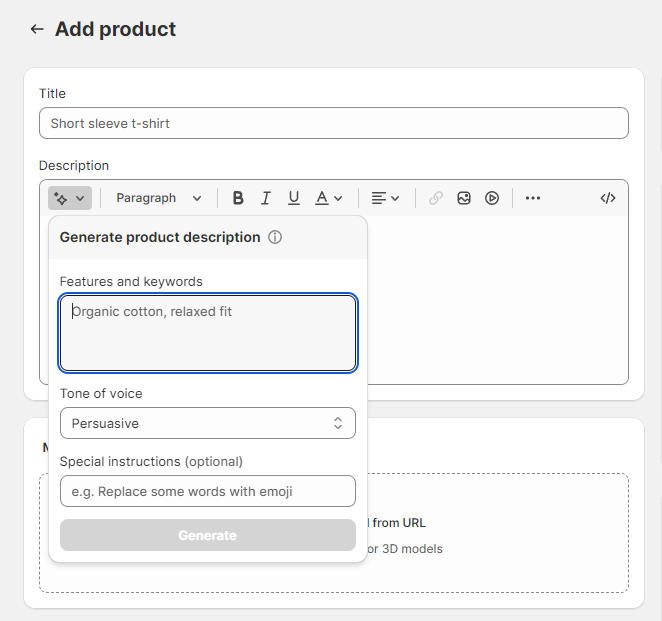
Square Online, scoring 7.4, does not have a dedicated AI builder but makes good use of AI algorithms for personalized product recommendations and has generative AI features designed to streamline operations and enhance workflow efficiency for businesses.
User Management
User ManagementAssesses the platforms’ capabilities in managing user roles, permissions, and accessibility.Score Components:
- Role Customization (40%): Flexibility in creating and defining user roles and
permissions. - Ease of Management (30%): User interface and tools for managing users.
- Access Control (20%): Effectiveness of access control measures for different user
levels. - Scalability (10%): Ability to manage a growing number of users efficiently.
 6.5
6.5
 5.2
5.2
🏆 Winner: Shopify
. Shopify offers a more structured approach to user management compared to Square Online.
- Shopify enforces staff account limits based on plans, ranging from 2 to 15, with Shopify Plus offering unlimited
accounts. Collaborators with limited access are also an option. - Square Online allows multiple staff accounts, however the platform does not specify how many accounts are supported.
Shopify User Roles and Access Levels:
| Role | Description | Access Highlights |
|---|---|---|
| Store Owner | Full control over store | Manage products, orders, discounts, payments, apps, settings. Create and manage staff accounts. |
| Staff | Configurable access by owner | Add/edit products, manage orders, fulfill orders, manage customers, update content. Access level can be customized by the owner. |
| Collaborator | Limited access for external partners | View and manage specific sections like blog or product categories. Cannot access full store settings. |
Square Online does not provide detailed information about user roles and access levels.
Additional Features
 |
 |
|
|---|---|---|
SSL Certificate |
||
Custom Domain |
||
Free Custom Domain Included |
||
International Domains |
||
Mobile Responsive |
||
Page Speed |
||
Website Builder Mobile App |
||
Convert a Website To An App |
||
Website Analytics |
||
Multilingual Sites |
||
Multiple Users |
Shopify vs Square Online: User Feedback
Shopify’s slightly higher rating on G2 Crowd can be largely attributed to its specialization in ecommerce. Its comprehensive features, ease of use, and robust customer support cater specifically to online businesses, leading to high user satisfaction among those seeking a dedicated ecommerce solution.
Square Online is appreciated for its ease of setup, no initial payment requirement for registration, and dependable payment processing. Users find its simple user interface effective for quick product sales and efficient inventory management. However, some users express dissatisfaction with the limited design customization options and the simplicity of the store layouts, noting that they do not match the design quality of competitors like Shopify. Additionally, limitations in scheduled order processing and a desire for more advanced features and better support for custom HTML and SEO were highlighted.
The making of this blog
We followed a clear, step-by-step process to write and research this article.
Shopify vs Square Online: FAQ
Which platform is better for ecommerce, Shopify or Square Online?
Can I use Shopify or Square Online for a non-ecommerce website?
How do Shopify and Square Online compare in terms of ease of use?
Which platform offers better design and customization options?
How do the pricing and value compare between Shopify and Square Online?
Which platform provides better customer support?
Are there any differences in security features between Shopify and Square Online?
How do Shopify and Square Online utilize AI capabilities?
Which platform is better for managing multiple users?









